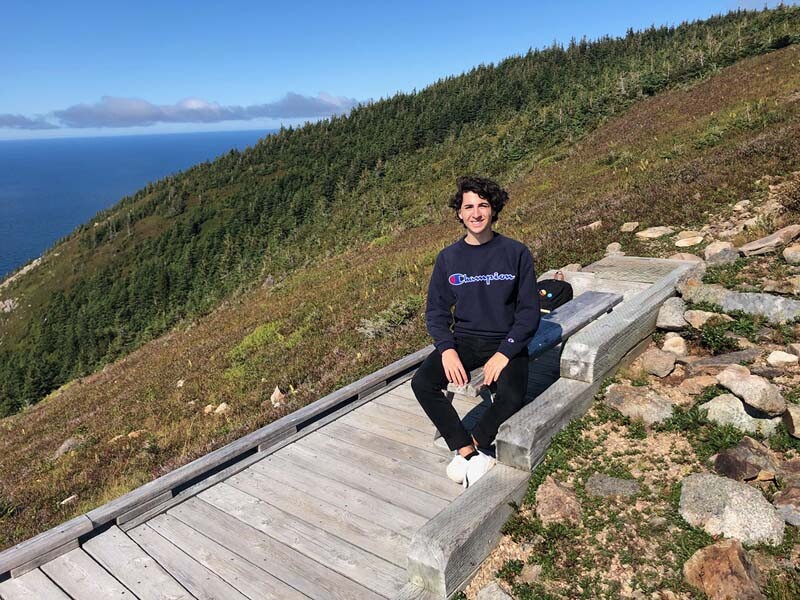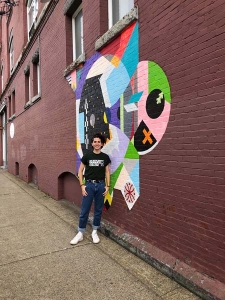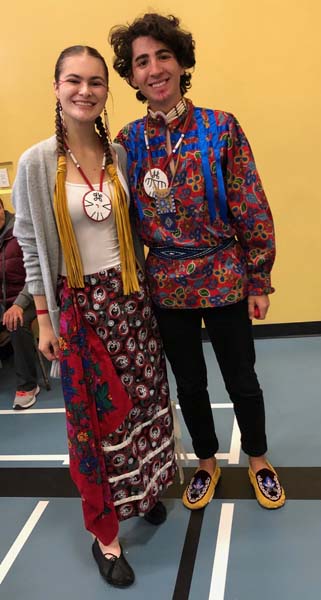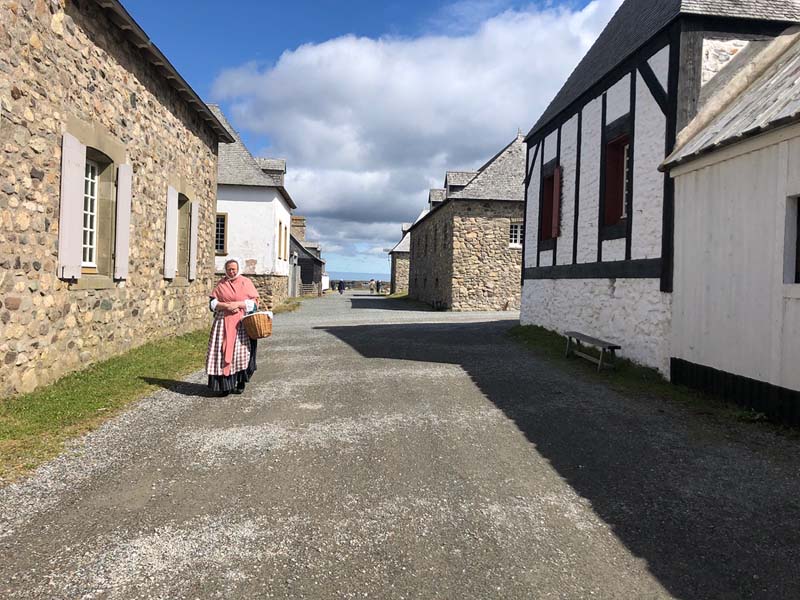
The following post was written by Global Gap Year Fellow Jacob Gerardi.
Author’s Note: Throughout this blog post, I will be referring to locations I visited throughout “Nova Scotia” using their Indigenous, Mi’kmaq place names. These place names were used for centuries, if not millennia, prior to the colonization of the area, so it is more fitting to use them due to the purpose of my visit to “Nova Scotia”. Next to the correct, Mi’kmaq place names will appear their English, colonized equivalent in parenthesis.
A canceled flight, a delayed flight. A canceled ceremony in Kejimkujik national park, a powwow missed at Gold River. A bus waited for for three hours in the cold outside the Wagmatcook Reserve gas bar, a category two hurricane and the power outages that accompanied it. As the phrase goes, anything that can go wrong will go wrong. Thus initially seemed to go my visit to Mi’kma’ki, known in settler vernacular as Nova Scotia.
I had the visit planned since I had found out I was taking a gap year. The land of my maternal Mi’kmaw ancestors, I feel that a part of me lies in the Maritimes. I felt that I had to visit, and my itinerary was chock full of cultural activities involving my nation. My cousin Jacob was to take me to a ceremony in Kejimkujik Park with several elders we knew, and I’d planned to make my powwow dancing debut at the Gold River Powwow.
 The first wrench thrown into my plans was a category two hurricane by the unassuming, almost kindly sounding name of Dorian. It will surely go out to sea, I had thought. After all, a category two hurricane hadn’t hit Nova Scotia since 2003. Yet surely, as my first week in K’jipuktuk (Halifax) came to an end, the storm remained steadfast on its slowly spinning journey northwards, somehow gaining momentum over the cold waters of the North Atlantic (which I didn’t even know was possible). And so it would be.
The first wrench thrown into my plans was a category two hurricane by the unassuming, almost kindly sounding name of Dorian. It will surely go out to sea, I had thought. After all, a category two hurricane hadn’t hit Nova Scotia since 2003. Yet surely, as my first week in K’jipuktuk (Halifax) came to an end, the storm remained steadfast on its slowly spinning journey northwards, somehow gaining momentum over the cold waters of the North Atlantic (which I didn’t even know was possible). And so it would be.
As the storm rolled into K’jipuktuk (Halifax) harbor, the sky turned dark, the wind whipped around the home I was staying in. I felt safe, as my Couchsurfing host, Sandra, was incredibly generous with food and protective over me like a mother. Still, the light knocking on the home’s clapboard siding reminded me of the ancient oak looming over the home in the front yard. My trip had fallen apart, it seemed. My first visit to the Mi’kmaq homelands as a Mi’kmaw person would end up being one of tourism, not of connecting with a culture living in New York has made me distant from. Altogether, it seemed a sign. Creator had made the decision for me: my spirit was not ready for ceremony, nor for the first time I was to dance in a powwow. Perhaps if I learned more of our teachings and studied our language, Creator would see I am ready, and my next visit would go more favorably.
But just as all seems lost, it is not always so. Sandra reminded me of shuttle busses between K’jipuktuk (Halifax) and Sipu (Sydney) in the North, where I was headed next in order to meet up with my cousin Charlotte at Unama’ki (Cape Breton) University. I called every shuttle company in K’jipuktuk (Halifax) and found one single, empty seat open on a morning shuttle between K’jipuktuk (Halifax) and Sipu (Sydney) right after the hurricane had passed fully over.
Where one door closed, another opened. As things began to go my way, I realized that my perceived misfortunes were just hiccups, and now a way for me to attend a different powwow had emerged. I didn’t have time to fully smudge that morning, but I kept a piece of sweetgrass in my pocket I’d received from a Kanien:kehá’ka elder the last week. I was hoping and praying all had happened for the right reasons and that my spirit would be ready to take the powwow floor in the Men’s Traditional Dance category.
 As my shuttle pulled into Mawpeltu’ek (Membertou) with just under ten minutes to spare before the grand entry, I had never felt so ready. It was my time! I’m sure my dancing was inferior to many others in the circle, my hand-sewn ribbon shirt paling in comparison with the elaborate eagle feather bustles around me. Yet, that is not the spirit of powwow. I took comfort in the support of those around me. I felt the drum beats deep in my chest, stepping to them and halting as the honor beats banged out harder yet.
As my shuttle pulled into Mawpeltu’ek (Membertou) with just under ten minutes to spare before the grand entry, I had never felt so ready. It was my time! I’m sure my dancing was inferior to many others in the circle, my hand-sewn ribbon shirt paling in comparison with the elaborate eagle feather bustles around me. Yet, that is not the spirit of powwow. I took comfort in the support of those around me. I felt the drum beats deep in my chest, stepping to them and halting as the honor beats banged out harder yet.
I try my best not to subscribe to clichés, as I find them often to be false. Yet still, I often return to one in particular, the idea that everything occurs with purpose, and further the events of our day-to-day conspire in a deliberate chronology. One of the most difficult things to do while traveling is to embrace spontaneity, whether that means eating chicken and all dressed chips (it’s a Canadian thing, so I’ve learned) for dinner, stuffing my tote bag with all-you-can-eat bread rolls (eight, to be exact), or finding entertainment while awaiting a bus that never seems to come.
While I was waiting for my bus at the Wagmatcook Reserve Gas Bar, I was approached by many people, curious as to what someone who looks to be about fourteen was doing waiting for a bus in a rural area. Others still recognized me from the Mawpeltu’ek (Membertou) powwow, and asked if I was headed back up there. One woman in particular, from the Eskisoqnik (Eskasoni) reserve, seemed especially worried about me. After explaining why I was in Mi’kma’ki (Nova Scotia) and waiting for a bus alone, she grabbed her chest in sadness – “Let your grandmother know when you’re ok!” she said. “My big Indian heart knows she’d be broken if anything happens to you. It’s how we are.” It made me feel good, to see someone being motherly to a young person she’d never met before. Besides reminding me to give my mom and my grandma a call, it really warmed my heart, and again reaffirmed my belief in the silly old cliché – everything happens as it should, and nothing is truly random. As I write this blog from that Maritime Bus, which came far too late, I am realizing it is not errors in travel itineraries that create problems and ruin trips, it is responding to them in the wrong way which does exactly this.

After all, I was safe, (somewhat) well-fed, and had a place to sleep every night of my trip. I had wonderful experience after experience. I connected with my grandfather’s cousin Peter, who I hadn’t seen in good time, and his companion Nancy, and we drove both to the Luipo’lk (Louisbourg) Fortress and around the whole of the Cabot Trail, merely because he happened to be in Mi’kma’ki (Nova Scotia) at the same time. I connected with my cousin Jacob in K’jipuktuk (Halifax), and I spent time with my cousin Charlotte in Unama’ki (Cape Breton Island), something I feel so fortunate for as I find more and more that she and I have kindred spirits.
Despite repeated issues, I had been repeatedly lucky as well, in fact exceedingly so.
As a parting thought, I’d like to ask you to think about a time in which you felt something had failed. Maybe you didn’t study well enough for a test and flunked it, maybe the train never came, maybe there was a hair in your birthday dinner or you had a quarrel with someone close to you. Look back on the details of the event. Think of how it conspired, how it felt. Now, think of whether you could’ve done anything to change the outcome once it had occurred. Not in retrospect, but in that exact moment. I obviously don’t know the event of which you’re thinking, but there’s a good chance your failure was not something worth fretting over. Something greater and more beneficial may have even come of this failure: you likely grew from it. Next time you face such an issue, then, I encourage you to accept it, and see where it takes you. We often grow in our ugliest hours, when we feel our lowest, something often out of our control. With this then, the next time you encounter such plight, approach it knowing the following to yourself: nothing occurs without purpose, nor without direction. Take comfort in this, and wait to see which way the winds will blow.
